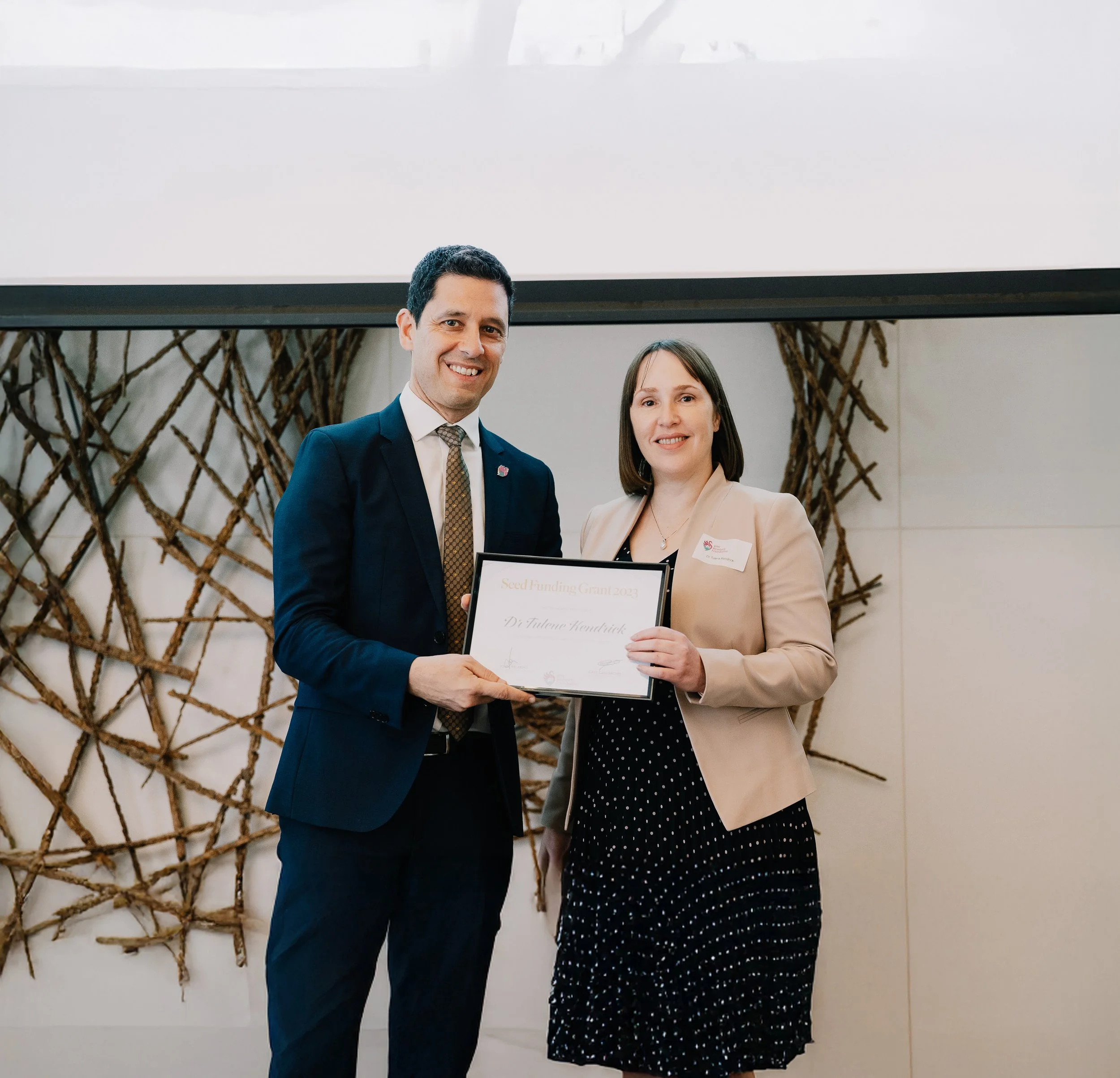
Dr Tulene Kendrick

Dr Tulene Kendrick
Refining the Diagnosis of Acute Myeloid Leukaemia
Royal Perth Hospital
Funding: $19,887
Coordinating Principal Investigator: Dr Tulene Kendrick
Co-Investigators: Professor Michael Leahy, Dr Hun Chuah, Professor Wendy Erber, A/Prof Kathy Fuller
Acute myeloid leukaemia (AML) is an aggressive blood cancer, where immature white blood cells (blasts) are produced. These take over the bone marrow and spill into the blood. The marrow is unable to make adequate red cells and platelets, leading to anaemia and bleeding. As the leukemia blasts don’t work the same as normal white blood cells, they don’t do the normal infection-fighting function leaving patients susceptible to serious infections. Every year, 100 Western Australians are diagnosed with AML. People can be diagnosed at any age, but it becomes more common with age mostly occurring after 60.
Acute myeloid leukaemia is associated with genetic changes, which determine how aggressive the leukaemia will be and will affect a patient’s prognosis. It is essential to detect any genetic mutations to determine the best treatment options including identifying if a patient will have to undergo bone marrow transplants. However, testing for these changes is difficult as almost half of AML patients do not have detectable chromosomal changes through standard tests, thus making it hard to determine the best treatment.
Currently, cytogenetic tests are used that study 20 – 200 cells, a really small fraction of the 1 billion leukaemia cells in the body. These tests are therefore imprecise and may miss critical genetic changes.
Dr Kendrick will address this problem by using a new innovative WA-developed invention, called “immuno-flowFISH”. It is 1,000 times more accurate than standard chromosome tests, and analyses at least 100,000 cells, focusing on the leukaemia cells. This patented technology has been shown to increase the accuracy for detecting genetic changes in other blood cancers, including chronic lymphocytic leukaemia and myeloma. Dr Kendrick aims to determine whether cases of AML-NK are truly “normal”, or if they have cytogenetic abnormalities that are currently being missed. If critical changes are detected, her research team will be able to refine diagnosis, optimise treatment and improve survival for patients with AML in WA. This new test strategy would be a world-first and has the potential for application globally.
Refining the Diagnosis of Acute Myeloid Leukaemia
Royal Perth Hospital
Funding: $19,887
Coordinating Principal Investigator: Dr Tulene Kendrick
Co-Investigators: Professor Michael Leahy, Dr Hun Chuah, Professor Wendy Erber, A/Prof Kathy Fuller
Acute myeloid leukaemia (AML) is an aggressive blood cancer, where immature white blood cells (blasts) are produced. These take over the bone marrow and spill into the blood. The marrow is unable to make adequate red cells and platelets, leading to anaemia and bleeding. As the leukemia blasts don’t work the same as normal white blood cells, they don’t do the normal infection-fighting function leaving patients susceptible to serious infections. Every year, 100 Western Australians are diagnosed with AML. People can be diagnosed at any age, but it becomes more common with age mostly occurring after 60.
Acute myeloid leukaemia is associated with genetic changes, which determine how aggressive the leukaemia will be and will affect a patient’s prognosis. It is essential to detect any genetic mutations to determine the best treatment options including identifying if a patient will have to undergo bone marrow transplants. However, testing for these changes is difficult as almost half of AML patients do not have detectable chromosomal changes through standard tests, thus making it hard to determine the best treatment.
Currently, cytogenetic tests are used that study 20 – 200 cells, a really small fraction of the 1 billion leukaemia cells in the body. These tests are therefore imprecise and may miss critical genetic changes.
Dr Kendrick will address this problem by using a new innovative WA-developed invention, called “immuno-flowFISH”. It is 1,000 times more accurate than standard chromosome tests, and analyses at least 100,000 cells, focusing on the leukaemia cells. This patented technology has been shown to increase the accuracy for detecting genetic changes in other blood cancers, including chronic lymphocytic leukaemia and myeloma. Dr Kendrick aims to determine whether cases of AML-NK are truly “normal”, or if they have cytogenetic abnormalities that are currently being missed. If critical changes are detected, her research team will be able to refine diagnosis, optimise treatment and improve survival for patients with AML in WA. This new test strategy would be a world-first and has the potential for application globally.
